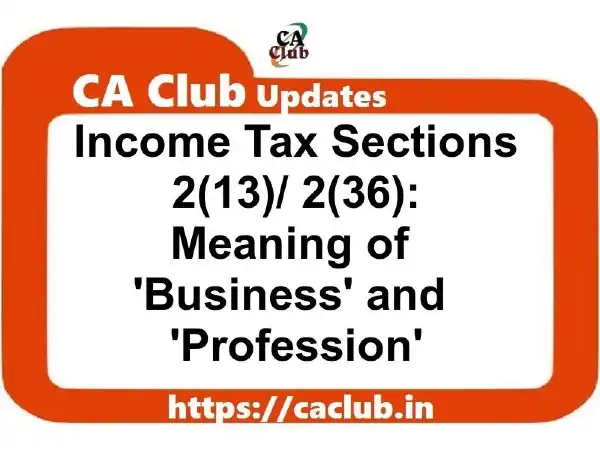Income from both ‘Business’ and ‘Profession’ is chargeable to income-tax under the head “Profits and gains of business or profession” as per Section 28 of the Income Tax Act, 1961, however there are certain other provisions of IT Act/ Rules, which require distinction between these two terms, like TDS, presumptive taxation schemes, tax audit requirements, etc.
The Income Tax Act, 1961 defines the terms “business” and “profession” for the purpose of taxation. Business refers to any trade, commerce, or manufacturing activity carried on for the purpose of earning profits or gains, while profession refers to any activity that requires specialized knowledge, skills, or expertise and is pursued as a means of livelihood.
Income earned from both activities is taxed under the head “profits and gains of business or profession”. The tax treatment for income earned from these activities depends on various factors such as the nature of the activity, the profits earned, and other statutory requirements.
Section 2(13) Income Tax: Meaning of ‘Business’
As per Section 2(13) of the Income Tax Act, 1961, unless the context otherwise requires, the term ‘business’ includes any trade, commerce or manufacture or any adventure or concern in the nature of trade, commerce or manufacture.
The term “business” is a broad concept that refers to any activity carried out systematically by an individual with the intention of earning an income. This activity does not necessarily have to be related to trade or manufacturing only. In the case of Barendra Prasad Ray v ITO [1981] 129 ITR 295 (SC), it was established that the term “business” encompasses a wide range of activities. In fact, the following activities have been recognized as businesses:
(i) Advertising agencies, which help clients promote their products or services through various channels, such as television, radio, print, and online media.
(ii) Clearing, forwarding, and shipping agencies, which assist in the transportation of goods from one place to another.
(iii) Courier agencies, which provide courier services to individuals and businesses.
(iv) Insurance agencies, which offer insurance policies to clients and earn a commission on the policies sold.
(v) Nursing homes/hospitals, which provide medical services to patients and earn revenue from fees charged for these services.
(vi) Stock/share/securities broking and dealing, which involve buying and selling of stocks, shares, and securities on behalf of clients.
(vii) Travel agencies, which arrange and coordinate travel plans for individuals and groups.
These are just a few examples of activities that can be considered as businesses. The key criterion for an activity to be considered as a business is that it must be carried out continuously and systematically with the aim of earning an income.
Section 2(36) Income Tax: Meaning of ‘Profession’
As per Section 2(36) of the Income Tax Act, 1961, unless the context otherwise requires, the term ‘profession’ includes vocation.
The term “profession” is a broad concept that encompasses occupations requiring intellectual or manual skills controlled by the intellectual skill of the operator, as opposed to operations substantially involved in the production or sale of commodities. This definition was established in the cases of CIT Vs. Manmohan Das (Deceased) [1966] 59 ITR 699 (SC) and Additional CIT v. Ram Kripal Tripathi [1980] 125 ITR 408 (All). Interestingly, the latter case clarified that the term “profession” also includes “vocation,” which is essentially a way of living.
Businesses can be of different types such as manufacturing, trading, service and so on. Similarly, there are different types of professions such as legal, medical, engineering and so on. Businesses can be undertaken by any individual while professions can be undertaken only by individuals who have the required qualifications. Businesses are usually governed by rules and regulations while professions are usually governed by code of ethics for respective profession. Different businesses and professions are taxed differently under the Income Tax Act, 1961. The rates of tax for different businesses and professions vary according to the nature and size of the business or profession.

Business means some activity carried on by devoting time, attention and labour either by the owner himself or through others?
An isolated transaction may be considered as business?